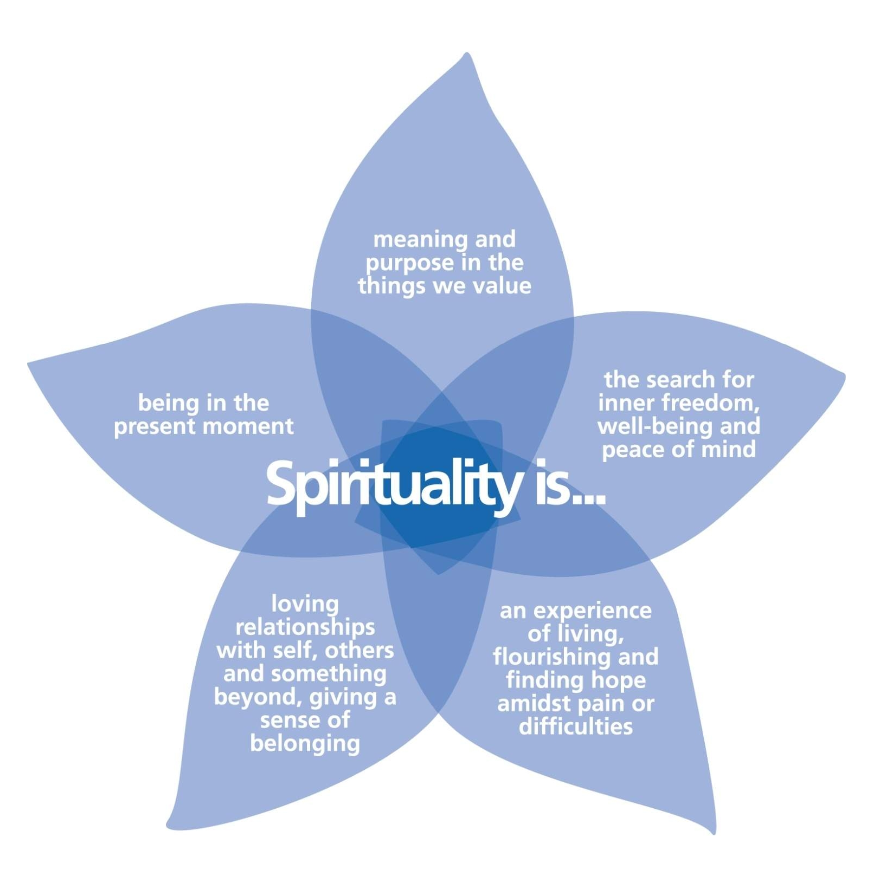The Spirituality Flower can be changed to show its four levels of use:

Copyright © Tees Esk and Wear Valleys NHS Foundation Trust 2011
Understanding or Permission:
In mental health services, we should expect staff to understand the role spirituality may play in our mental wellbeing. We should expect to be allowed to talk about our spirituality in a safe and respectful way.
Immediate Needs:
Is there anything in the Spirituality Flower that seems most important when you first considered it?
Going deeper:
Taking time to consider all the individual questions that accompany each petal.
Action:
What you can do to care for your spiritual health.
Consider more:
u003colu003ern tu003cliu003eAre there any words that seem particularly important or relevant to you at the moment?u003c/liu003ern tu003cliu003eWhat makes these important or relevant to you now?u003c/liu003ern tu003cliu003eHave you been surprised or helped by your thoughts in response to these questions?u003c/liu003ern tu003cliu003eTry and think of five things you could do to care for your spiritual health.u003c/liu003ernu003c/olu003e
The petals of the Spirituality Flower
Having looked at the Spirituality Flower, we are going to explore the ideas you have come up with in more depth. To do this, spend some time considering the questions that go along with each petal of the flower below.
It is possible to think about these questions by yourself. You might also find it helpful to discuss them with a member of staff, or perhaps with a chaplain if you have access to one.
Please remember, it is absolutely your choice to decide which, if any, of these questions are relevant to you at the moment.
Petal One
Petal 2
Petal 3
Petal 4
Petal 5
You can fill in each petal of the blank document below using some of your thoughts to the above questions.
The spirituality flower document (90.76kB)
What could you do next?
Using the Spirituality Flower
- Use the Spirituality Flower to explore your spirituality and spiritual needs in greater depth. Discuss this with another person if that helps. A friend or family member or someone involved in your care.
Religious practice
- You could try making provision for religious practice. You may wish to attend worship or prayers; you may need resources such as scriptures, a prayer mat or a rosary. Or to ensure that your religious dietary requirements are catered for.
Non-spiritual practice
- You could try making provision for non-religious spiritual practice. You may experience spiritual benefit in such things as walking and exercise. You might find the following helpful: accessing nature, creative activities such as art, music, cookery or gardening; practising yoga, meditation or Tai Chi helpful.
Chaplaincy
- You could be referred to a chaplaincy service. There are many organisations with chaplains who are available to talk to anybody about anything. Chaplains may be from any faith and are recognised and authorised by their faith communities to offer this kind of care. Chaplains are not just for religious people. You can trust a chaplain to listen to you and not to judge you.
Therapies
- Referral to specialist therapies: there are some therapies available which have a particular spiritual dimension to them. One example is mindfulness-based cognitive therapy, which can be effective for people with recurrent depression, anxiety problems or other difficulties.
Local faith group
- Making contact with a local faith group: you may wish to find out about a particular faith, to begin practicing it, or to resume a practice which has been important to you in the past by making contact with a local faith community.
Local activity group
- Making contact with a local activity group: It may be that there are local groups which you can get involved in. Voluntary work can help support your spirituality.
Consider more:
u003cdiv class=u0022pageu0022 title=u0022Page 150u0022u003ernu003cdiv class=u0022sectionu0022u003ernu003cdiv class=u0022layoutAreau0022u003ernu003cdiv class=u0022columnu0022u003ernu003colu003ern tu003cliu003eCan you think of someone you can discuss your spiritual needs with?u003c/liu003ern tu003cliu003eWhat spiritual or religious practices could you get involved with?u003c/liu003ern tu003cliu003eMight you want to request a referral to a chaplain or specialist services?u003c/liu003ern tu003cliu003eIs there a local faith or activity group you could join?u003c/liu003ernu003c/olu003ernu003c/divu003ernu003c/divu003ernu003c/divu003ernu003c/divu003e